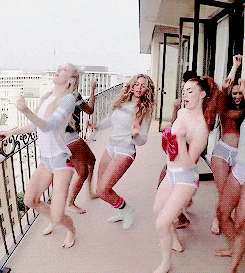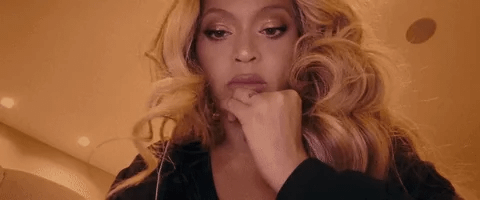Two things are happening simultaneously. It is a fuck-ass time to be alive in America. Between unimaginable floods washing away human lives, disasterous Bills cutting our social safety net and the Supreme Court folding like a card table, I’m disgusted.
But… at the same time, I'm over here experiencing true JOY watching a masterclass in Black creative resistance. July 4th is my birthday, and I chose to celebrate it the way God intended, with Beyoncé. As someone who writes retellings and studies how cultures transform narratives, I'm seeing something much deeper happening – and it's giving me ALL the ideas about how we as creatives can reclaim spaces that tried to exclude us.
What We Do In The Shadows:
Let's talk about subversion as a tactic, because what Beyoncé is doing with Cowboy Carter connects to a long tradition of Black cultural resistance that anthropologists have been documenting for centuries. But first, for those of you asking, “Why be sneaky about it? Why not just say it loud and proud?
Let's keep it 100: Black folks been saying it loud and proud since forever. The problem isn't volume, my good sis– it's that when we're direct, we get dismissed, criminalized, or worse:
The Moynihan Report (1965): When Black scholars directly critiqued white family structures, they were labeled as "attacking American values"
The Black Panthers: Direct political action led to FBI infiltration and systematic destruction
Colin Kaepernick: Literally took a knee – the most respectful form of protest possible – and got blackballed from his entire industry
TL;DR Some bodies aren’t safe to take direct routes.
Ok, now that’s that out of the way,…Let’s get nerdy!
This is an old ass reference but the bones still work so I’ll use it. The title also sucks but hear me out!! In his work "Weapons of the Weak" (1985), Dr. James C. Scott identifies how subordinated groups use everyday forms of resistance – what he calls "the hidden transcript" – to challenge power structures without direct confrontation. But Black creative resistance was even more sophisticated than that.
The Mask Strategy: Dr. Hazel Carby, in "Cultures in Babylon" (1999), documents how Black performers have historically used minstrel forms and popular entertainment to smuggle in radical messages. When Beyoncé appears in Elvis drag during the tour, she's participating in this tradition – using the iconography of appropriation to expose the theft.
The Redefinition Tactic: Anthropologist Dr. Robin D.G. Kelley, in "Race Rebels" (1994), demonstrates how Black creators consistently repurpose symbols of oppression as tools of liberation. Country music, the American flag, the cowboy aesthetic. We’re seeing women, men, the LGBTQ community, and people of color adorn themselves in symbols they have felt ambivalent about belonging to.
The Archive Strategy: Dr. Saidiya Hartman's work on "critical fabulation" in "Wayward Lives, Beautiful Experiments" (2019) demonstrates how Black creatives use historical recreation to make visible what dominant narratives have erased. When Beyoncé interpolates archival footage with her own performances, she's practicing critical fabulation in real time.
These are the "hidden transcripts" – the way oppressed groups communicate resistance in coded language that the dominant group doesn't recognize as subversive. But Beyoncé flipped the script. Her transcript isn't hidden at all. It's 70,000 people loud, and folks are paying premium prices to receive it.
Ok, two hot takes and I’m out of your hair:
Hot Take #1: The Cash Grab is the Point
I have to admit, at first, I was a little turned off by Cédred and Sir Davis' full-frontal promotion during the show. I’m like Sis, you got my mortgage payment. What else DO you need? Blood? Plasma?
It was what I was trying to relay, perhaps less subtly, in Pride and Protest, when my billionaire hero, Dorsey, and Liza the activist talk about what really moves the needle. Money or passion. They fundamentally disagree on whether one can be ethically wealthy in a capitalist structure or whether one can ethically consume.
Beyoncé has weaponized capitalism to fund cultural reclamation. She's using her economic power to create what economist Dr. Juliet Schor calls "alternative economic spaces" – areas where different values can flourish within capitalist structures. Every time someone buys a ticket to see her "correct" American history, they're funding the very apparatus that's dismantling white cultural supremacy.
This connects to anthropologist Dr. Katherine Browne's work on "economic anthropology," which shows how marginalized groups create "parallel economies" that serve their own community's needs while operating within dominant systems. It could be an economic model for how marginalized artists can fund their own liberation projects:
TL;DR: Use the master's tools to build our own house, then invite everyone to see how much better our house looks.
Hot Take #2: For a time, the Politics of Respectability Gave What Ought to be Gave
Beyoncé's "performance of perfection" is so over-talked about, I’ll spare ya’ll. But before Black excellence became exhausting, it was one of the culture’s greatest tools against narratives that position us as inherently lacking.
Anthropologist Dr. John Jackson Jr., in "Real Black" (2005), discusses how African Americans use "performance of respectability" as both survival strategy and subtle resistance. But Beyoncé takes this further. Her level of production, vocal ability, and visual storytelling it exceeds white standards so dramatically that it exposes how arbitrary those standards and gatekeepers were in the first place.
Even when she brings Blue Ivy on stage to perform, she's letting you know she is not just a flash in the pan. It’s what anthropologist Dr. Carol Stack calls "adaptive kinship networks" in "All Our Kin" (1974). She's showing that Black creative genius isn't accidental or individual; it's cultivated and passed down.
What This Means for Marginalized Creatives: The Practical Applications
So what can we learn from Beyoncé's reclamation project? Write these down. Share these out. We’re building a playbook.
1. Master the Form Before You Transform It
Beyoncé isn’t fucking dabbling. She studied country music, honored its Black roots, and then reimagined it entirely. These Jane Austen retellings are the result of love and study. Not just adding Black characters to existing plots. I’m interested in the social mechanisms Austen documented, understanding how they work, and then showing how they'd function in different cultural contexts.
2. The Archive Is a Weapon
The most powerful moments in Cowboy Carter happen when Beyoncé places herself in direct conversation with erased Black history. She samples, interpolates, and visually references the artists who came before her. As creatives, our work becomes more powerful when we're explicit about the traditions we're continuing. There is an academic Movement, # CiteBlackWomen, and one of my favorite Podcasts in the World, Our Ancestors Were Messy, both of which speak to the power of the archive.
3. Make Them Pay for Their Education
This might be the most radical lesson: Don't give away your cultural education for free. When Beyoncé charges premium prices for a show that's essentially a Black history lesson, she's modeling how we can value our cultural labor. Your retelling, your perspective, your cultural insight – that's valuable intellectual property. You don’t have to give it away for the dubious pleasure of exposure or access to spaces you belong in anyway. Get👏🏽 Your👏🏽 Bag👏🏽
4. Claim Space Unapologetically
The message "Never ask permission for something that already belongs to you" isn't about country music. It's about every damned space where Black creativity has been excluded, erased, or appropriated. Romance novels, classical music, academia, film – you can cure that Shirley Cesar clip #younameit!
We don't need permission to be excellent in spaces our ancestors helped create and nurture.
The Bottom Line
Oppressed groups can and do use dominant cultural forms to create what Dr. Antonio Gramsci called "counter-hegemonic" narratives – stories that challenge power structures from within.
For Marginalized creatives, this suggests a powerful strategy: Don't avoid mainstream forms or dominant cultural spaces. Master them, transform them, and use them to tell the stories that those spaces were designed to exclude.
When I write Black romance novels based on classic literature, I hope to also be working in that subversive space. Love stories, family dynamics, and relationship patterns in Black communities are worthy of the same literary attention that white stories receive. I like to think I'm practicing the Beyoncé model: claiming what already belongs to us.
And if they want to learn about it, they can pay full price for the privilege.
Drop examples below of subversive acts you’ve committed, no matter how small, for a cause you believe in.
Sources:
Scott, James C. (1985) "Weapons of the Weak: Everyday Forms of Peasant Resistance"
Carby, Hazel V. (1999) "Cultures in Babylon: Black Britain and African America"
Kelley, Robin D.G. (1994) "Race Rebels: Culture, Politics, and the Black Working Class"
Hartman, Saidiya (2019) "Wayward Lives, Beautiful Experiments: Intimate Histories of Social Upheaval"
Schor, Juliet (2010) "Plenitude: The New Economics of True Wealth"
Browne, Katherine E. (2004) "Creole Economics: Caribbean Cunning Under the French Flag"
Jackson Jr., John L. (2005) "Real Black: Adventures in Racial Sincerity"
Stack, Carol B. (1974) "All Our Kin: Strategies for Survival in a Black Community"
Gramsci, Antonio (1971) "Selections from Cultural Writings"











Whenever I read your newsletter, I feel like I've been to school and church.
Happy belated birthday!
Your mind, I swear to god.